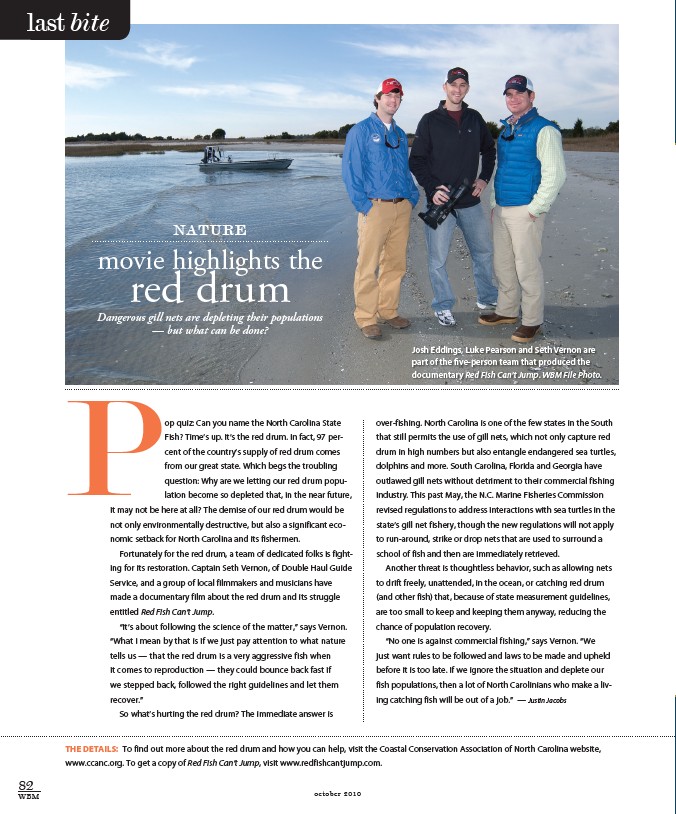
op quiz: Can you name the North Carolina State
Fish? Time’s up. It’s the red drum. In fact, 97 percent
of the country’s supply of red drum comes
from our great state. Which begs the troubling
question: Why are we letting our red drum population
become so depleted that, in the near future,
last bite
it may not be here at all? The demise of our red drum would be
not only environmentally destructive, but also a significant economic
setback for North Carolina and its fishermen.
Fortunately for the red drum, a team of dedicated folks is fighting
for its restoration. Captain Seth Vernon, of Double Haul Guide
Service, and a group of local filmmakers and musicians have
made a documentary film about the red drum and its struggle
entitled Red Fish Can’t Jump.
“It’s about following the science of the matter,” says Vernon.
“What I mean by that is if we just pay attention to what nature
tells us — that the red drum is a very aggressive fish when
it comes to reproduction — they could bounce back fast if
we stepped back, followed the right guidelines and let them
recover.”
So what’s hurting the red drum? The immediate answer is
The Details: To find out more about the red drum and how you can help, visit the Coastal Conservation Association of North Carolina website,
www.ccanc.org. To get a copy of Red Fish Can’t Jump, visit www.redfishcantjump.com.
82
WBM october 2010
over-fishing. North Carolina is one of the few states in the South
that still permits the use of gill nets, which not only capture red
drum in high numbers but also entangle endangered sea turtles,
dolphins and more. South Carolina, Florida and Georgia have
outlawed gill nets without detriment to their commercial fishing
industry. This past May, the N.C. Marine Fisheries Commission
revised regulations to address interactions with sea turtles in the
state’s gill net fishery, though the new regulations will not apply
to run-around, strike or drop nets that are used to surround a
school of fish and then are immediately retrieved.
Another threat is thoughtless behavior, such as allowing nets
to drift freely, unattended, in the ocean, or catching red drum
(and other fish) that, because of state measurement guidelines,
are too small to keep and keeping them anyway, reducing the
chance of population recovery.
“No one is against commercial fishing,” says Vernon. “We
just want rules to be followed and laws to be made and upheld
before it is too late. If we ignore the situation and deplete our
fish populations, then a lot of North Carolinians who make a living
catching fish will be out of a job.” — Justin Jacobs
nature
movie highlights the
red drum Dangerous gill nets are depleting their populations
— but what can be done?
P
Josh Eddings, Luke Pearson and Seth Vernon are
part of the five-person team that produced the
documentary Red Fish Can’t Jump. WBM File Photo.